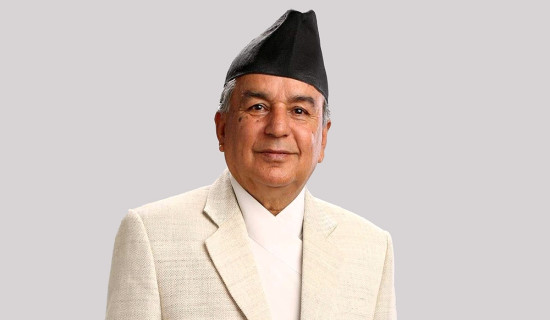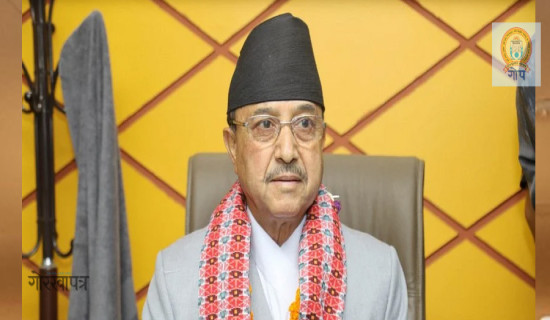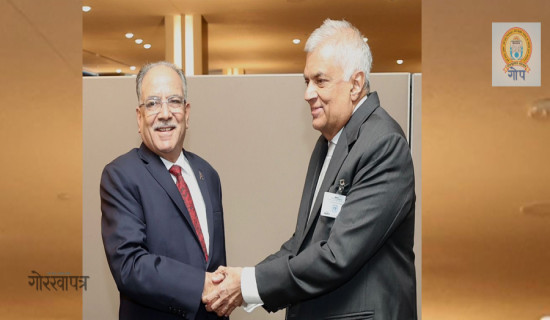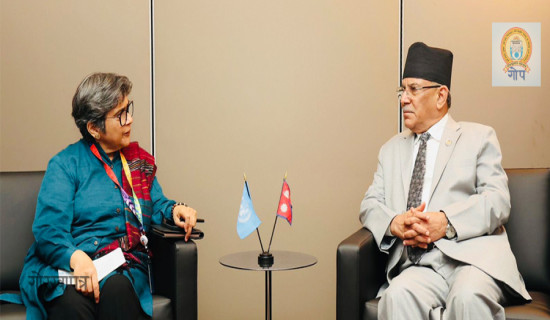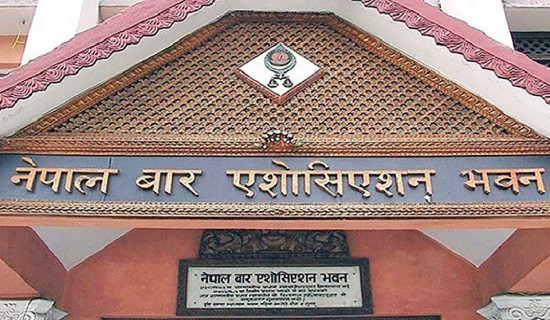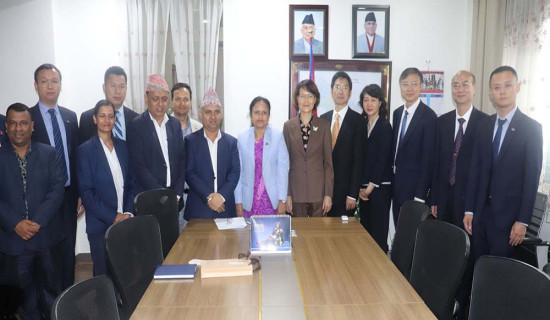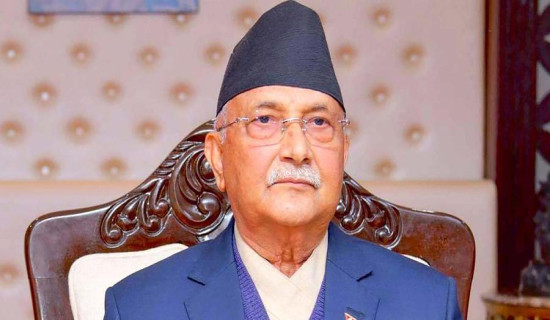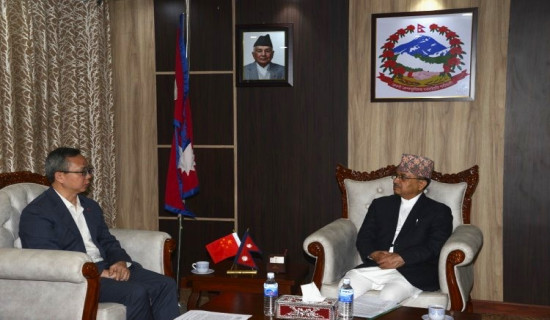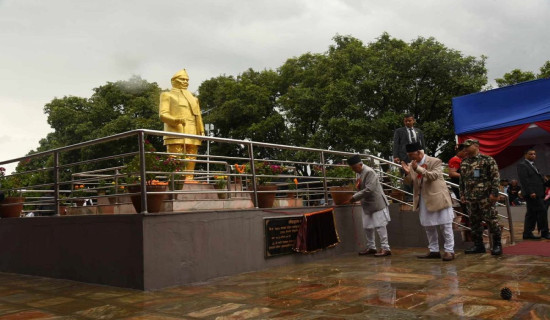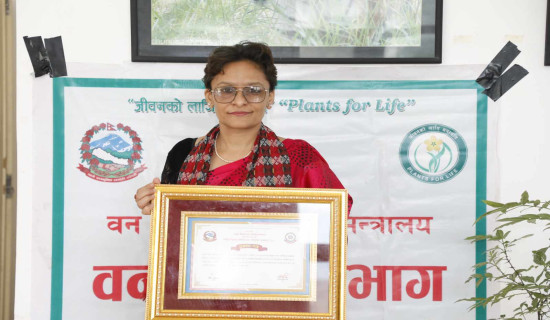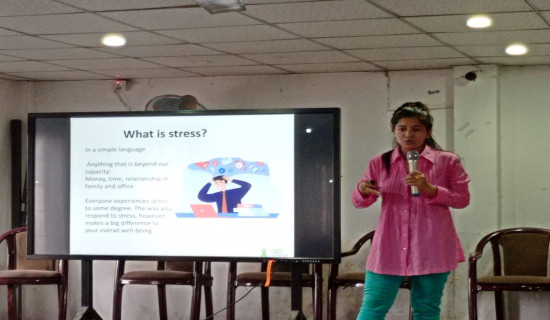- Sunday, 21 September 2025
General public should be assured with social security-President Paudel
President Ram Chandra Paudel has said equal access of all citizens to the state-sponsored services and entitlements should be established and their social security be ensured in line with the Constitution.
Present Constitution, epochal achievement in Nepal's political history-Acting PM Khadka
Acting Prime Minister and Minister for Defense Purna Bahadur Khadka said the present Constitution was an epochal and historical outcome in the political history of Nepal.
PM Prachanda , Sri Lankan President meet
Prime Minister Pushpa Kamal Dahal 'Prachanda' and Sri Lankan President Ranil Wikremesinghe held a meeting on the sidelines of the 78th United Nations General Assembly in New York on Tuesday.
UN high representative Fatima calls on PM Prachanda
United Nations high representative Rabab Fatima called on Prime Minister Pushpa Kamal Dahal 'Prachanda' who had arrived New York leading Nepal in the 78th session of the United Nations General Assembly (UNGA).
670 prisoners get pardon on Constitution Day
On the occasion of the Constitution Day, President Ramchandra Paudel has, on the recommendation of the Council of Ministers, pardoned the remaining sentence of 670 prisoners.
NBA decries amendments made to Judicial Council Regulations
The Nepal Bar Association (NBA) has criticized the recent amendments made to the Judicial Council Regulations.
Chinese delegation calls on Communications Minister Sharma
Standing Committee Member and Publicity Department Chief of Communist Party of China Yunnan Province, Zeng Yan paid a courtesy call on Minister for Communications and Information Technology Rekha Sharma here on Tuesday.
Acting PM Khadka, Chinese Ambassador meet
Ambassador of China to Nepal Chen Song on Tuesday called on Acting Prime Minister and Defence Minister Purna Bahadur Khadka at the Ministry of Defence.
Recommendation for the appointment of 36 judges
The meeting of the Judicial Council today has decided to appoint 36 new district judges.
670 prisoners get pardon on Constitution Day
On the occasion of the Constitution Day, President Ramchandra Paudel has, on the recommendation of the Council of Ministers, pardoned the remaining sentence of 670 prisoners.
President Paudel unveils life size statue of Ganeshman
The 12-feet high statue was constructed using 1,002-kg of metal. The Ganeshman Singh Memorial Park and Statute Protection Committee installed the statue at Ganeshman Park in Suryabinayak municipality-5, Katunje.
'Science and Technology Award 2023’ to TRN’s Aryal
This esteemed award, which includes a cash prize of Rs. 25,000 and a certificate, was established three years ago to recognize and appreciate individuals and institutions for their exceptional contributions in their respective fields.
Terisa Tamang's Inspiring Journey in Transforming Cancer Patients' Mental Health
By A Staff Reporter, Kathmandu, Sept 19: In a developing country like Nepal, where resources are scarce and mental health awareness remains a challenge, one woman's determination to make a difference has sparked a remarkable journey of hope and change.Meet Terisa Tamang, the founder of Dhairya Cancer Foundation, whose passion for supporting cancer patients and addressing mental health stigma has transformed lives and perceptions across Nepal.It all started when Terisa was just 17 years old. A national news broadcast introduced her to the tragic story of a teenage boy battling kidney cancer, who, in desperation, took his own life. Deeply moved by this heart-wrenching event, Terisa was inspired to do something to help cancer patients facing not only physical struggles but also mental health challenges.In Nepal, the lack of specialized counseling centers and proper services for cancer patients presented a daunting obstacle. However, an eye-opening trip to the United Kingdom changed Terisa's perspective. Witnessing how UK hospitals prioritized cancer patients' mental health, she returned to Nepal with a newfound determination to establish the Dhairya Cancer Foundation.But it wasn't an easy journey. Terisa faced numerous challenges, including difficulty explaining the importance of emotional support to health workers and educated individuals who dismissed the significance of psychosocial assistance. Some even questioned why anyone would spend money on counseling when they could save it for medical treatment.Despite the discouragement and pressure to go abroad for further studies, Terisa remained steadfast in her commitment to create a positive impact within Nepal. She knew that the perception of counseling needed to change, especially among cancer patients who feared societal judgment and ostracization. The prevailing belief that counseling was solely for "crazy" or "mad" individuals had to be challenged, and Terisa was determined to do just that.One critical aspect that Terisa identified during her psychosocial support sessions was the glaring disparity in how female cancer patients were affected compared to their male counterparts. Women, often the heartbeats of households, found themselves battling not only the physical pain of cancer but also societal expectations. Ignored by family members, burdened by household responsibilities even when unwell, and grappling with emotional neglect from husbands, these women faced an uphill struggle that impacted their mental well-being significantly.Through the Dhairya Cancer Foundation, Terisa and her team have worked tirelessly to provide a safe space for these women. The foundation's initiatives, such as art therapy for cancer-afflicted children collaborating with Kanti Childrens’ Hospital, peer support programs, and a unique knitting socks campaign representing different types of cancer, have empowered and uplifted nearly 30,000 individuals. The colors and symbolism of the socks speak volumes—lavender for all types of cancer, pink for breast cancer, golden for childhood cancer, and more, each thread woven with hope and awareness.Terisa's vision for the future is ambitious yet rooted in compassion. She plans to expand mental health programs across Nepal and establish specific counseling centers tailored to the needs of cancer patients and their families. With unwavering determination, she seeks to empower every individual affected by cancer, offering them hope, endurance, and vital mental health support.In the face of adversity, Terisa's resilience and commitment shine through. Her unwavering dedication to her homeland and its people have made a profound impact, breaking down mental health barriers and encouraging society to recognize the importance of emotional well-being.Terisa Tamang's story is a testament to the transformative power of one individual's passion and determination. In a nation where mental health awareness is crucial, her efforts have lit a beacon of hope, illuminating the path towards a brighter and more compassionate future for all of Nepal.
Local initiatives and power of grassroots movements for climate action
One of the most significant contributions of grassroots climate movements is their ability to build public awareness and engagement on climate issues. Grassroots climate movements are also holding governments and corporations accountable for their climate commitments.


